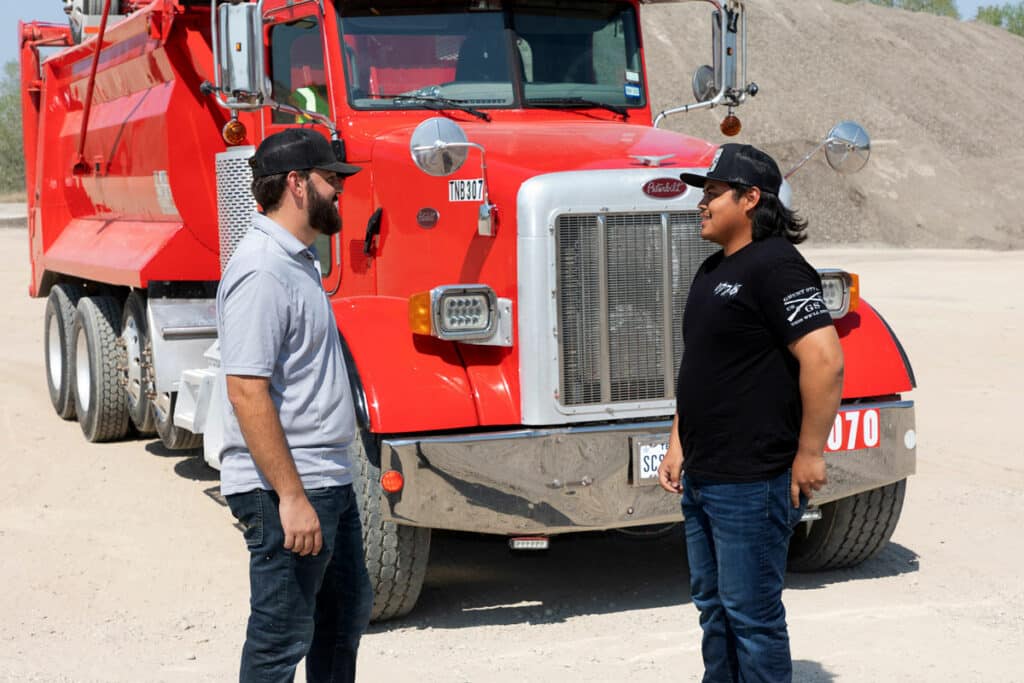How to Order Road Base in Texas
Ordering road base in Texas can be confusing, but we are here to help. Twisted Nail provides delivery services to bring the road base directly to your job, whether it’s a commercial site or a residential area. Just contact us with your needs, and we’ll ensure efficient delivery with clear communication. For road base needs in Central Texas, Twisted Nail is a dependable option.
Visit twistednail.com or call (254) 651-3597 to order materials and arrange trucks to bring your project to life.
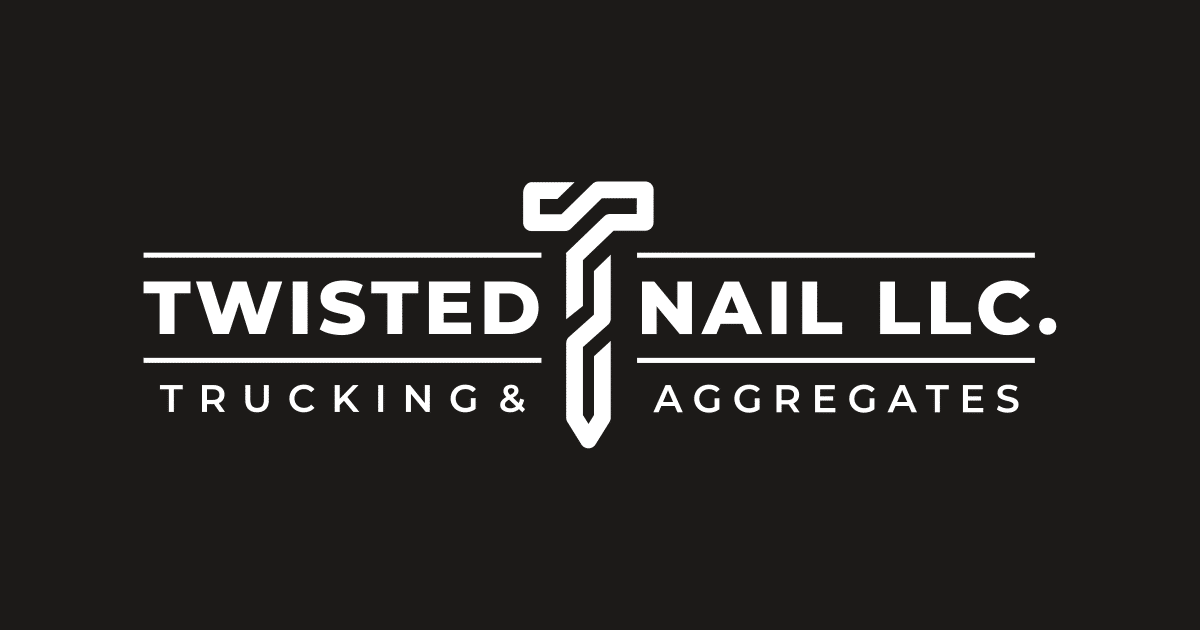
What is Road Base?
Road base serves as a crucial foundation for roads, driveways, and buildings, offering a sturdy surface for asphalt, concrete, or aggregate structures. Types include State Spec Road Base, meeting Texas’ quality standards, Flex Base without such requirements, and Crushed Concrete Road Base, made by recycling used concrete. Crushed Concrete can substitute Flex Base or even meet State Spec Base standards in some cases, providing an environmentally friendly alternative.
OUR LIMESTONE SUPPLY
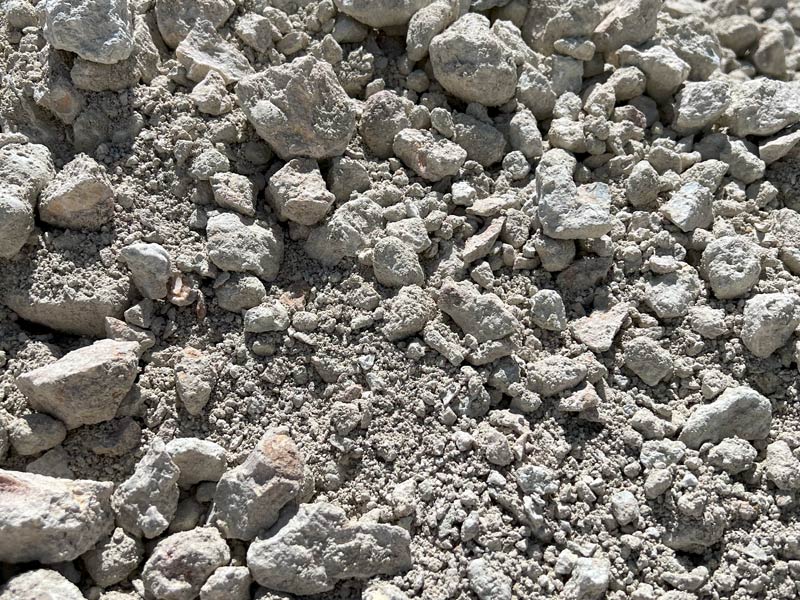
Limestone Base
Limestone base, vital for driveways, parking lots, and more. The material is a mixture of dust (0”) to a specified max size of rock. It is offered as both Spec Base, which will conform to consistency testing requirements, and as a Flex Base, which is offered as roughly the advertised size but is not regulated.
Size: 0” to ¾”, 0” to 1”, 0” to 2”, 0” to 3”, Flexbase
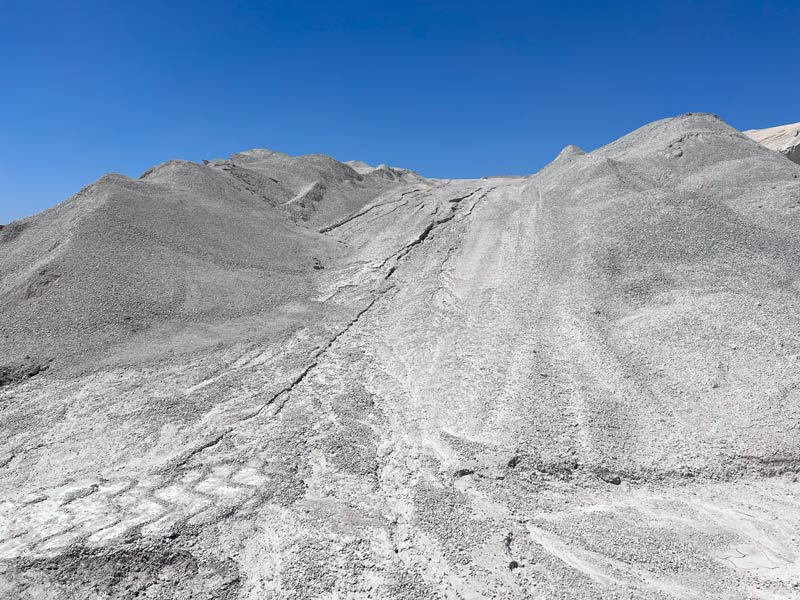
Crusher Fines/Screenings
Crusher fines are sold as the byproduct from the aggregate crushing process. Similar to Limestone Base, crusher fines range from dust (0”) to a maximum size rock (⅜”). The material is most often used as to build non-spec foundations, country roads or driveways, and is used as affordable fill material.
Size: 0” to ⅜”
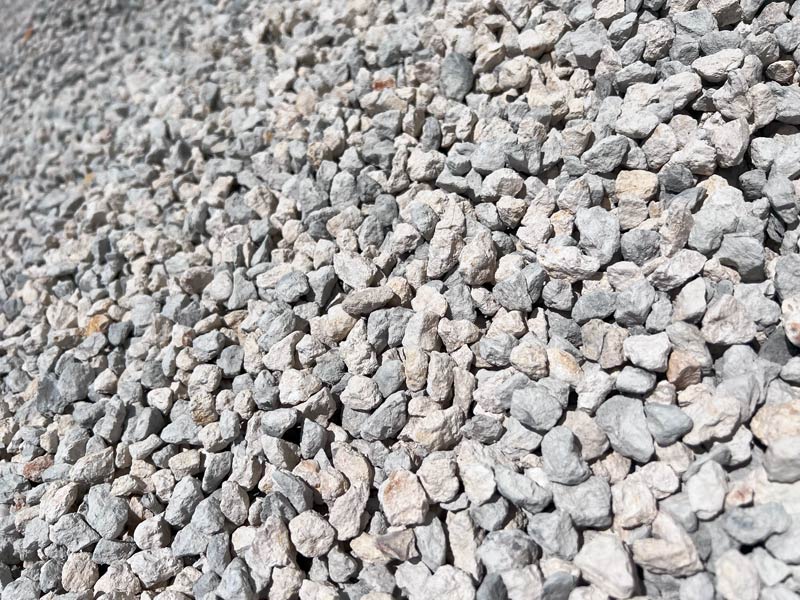
Limestone Screened Rock
Screened limestone is a versatile material used as topping rock in driveways or parking lots, in landscaping applications, and is used heavily in commercial construction. The crushed nature of the material, when compact, allows for a very stable foundation for walking and driving.
Size: ⅜”, ¾”, 1”, 1 ¼”, 1 ½”, 2”, Grade 3, Grade 4, Grade 5, Grade 7, #57 Rock
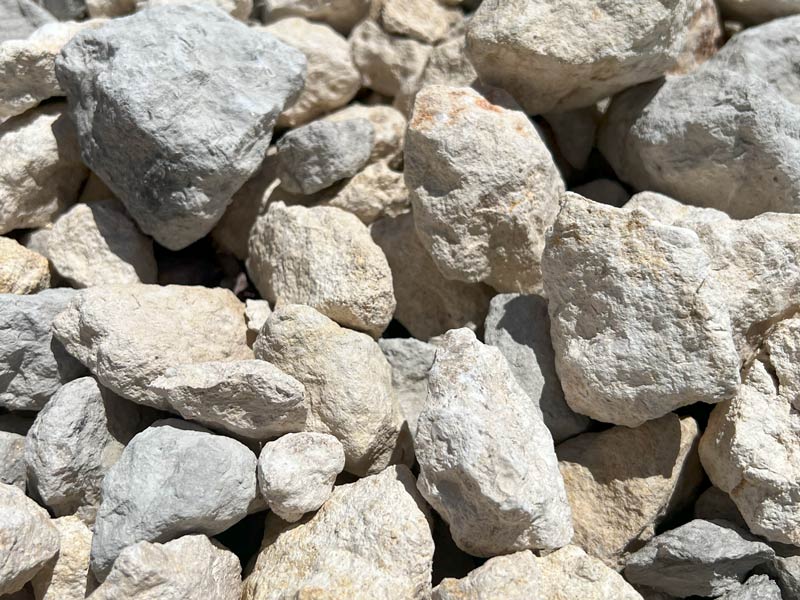
Limestone Bull Rock
Limestone bull rock is durable and weather resistant. The material is both tough and attractive. It is primarily used in building retaining walls, improving drainage and erosion control, fortifying construction entrances, and various landscape applications.
Size: 1”x2”, 1”x3”, 1”x4”, 2”x3”, 2”x4”, 2”x5”, 3”x5”, 3”x8”, 4”x8”, 5”x8”, 6”x8”
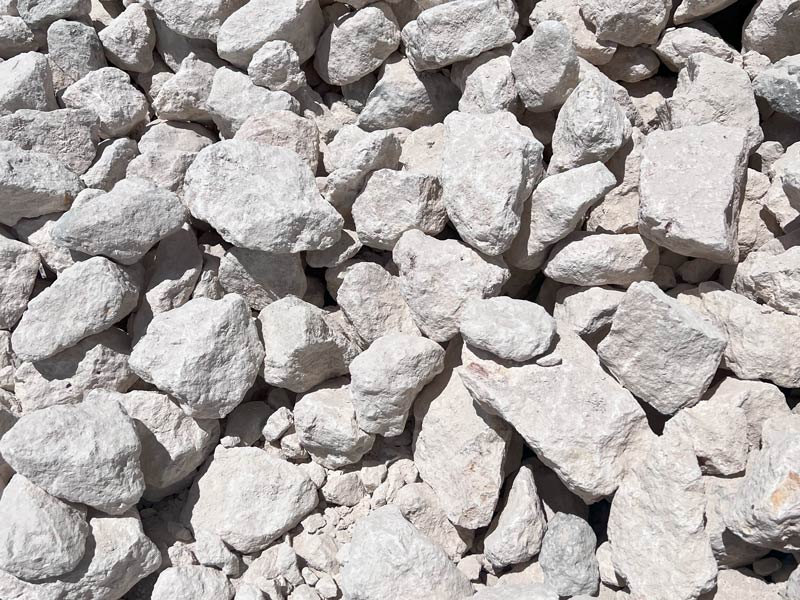
Limestone Rip Rap
Limestone rip rap is primarily used as fill material or to fortify shorelines, riverbanks, and slopes against erosion. Also absorbs wave energy, defends structures, and is ideal for coastal protection, bridge abutments, and other erosion control projects.
Size: 3”x5”, 4”x8”, 5”x8”, 8”x10”, 12”, 12”x18”, 12”x24”, 18”, 18”x24”, 24”, 24”x36”, 30”, 36”+
Why Road Base is Required for Roads & Driveways
Road base is a necessary material for properly installing paved roads and driveways. It is a foundational material that ensures your investment has a stable base and helps prevent early degradation of the installed improvements. Once compacted, road base is a very durable material, offering a strong, long-lasting base for high-use areas.
Road Base Options
Road base comes in various forms, but the most common options are state-spec road bases, flex base, and crushed concrete road base. State Spec Road Base/State Spec Base has passed the standardized specifications set by the State of Texas. The material is required to be a consistent composition and will be very high quality.
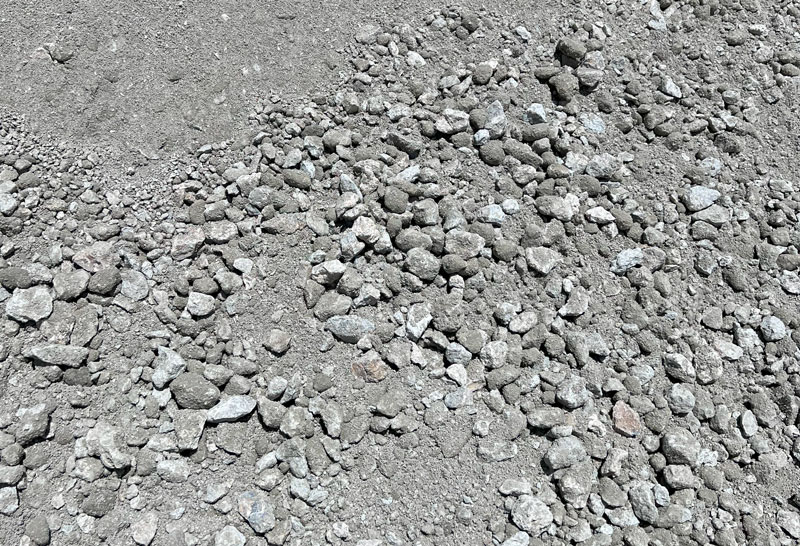
State Spec Road Base
State Spec Road Base is essentially road base material that has been carefully tested and approved according to the standardized specifications established by the State of Texas. This means it’s undergone thorough quality control measures to ensure it meets the state’s requirements for road construction.
State Spec Road Base is meticulously tested and approved to meet the rigorous standards set by the State of Texas. Texas employs a thorough evaluation process, assessing factors such as gradation, strength, and durability to ensure the material’s compliance with state requirements for road construction. This meticulous testing guarantees high-quality and consistent composition, making State Spec Road Base a trusted choice for road projects across Texas. It’s one of the go-to choices for road construction projects in Texas because it’s been certified to meet the state’s strict standards.
Flex Base
Flex Base is a base that has not passed the State Spec requirements. It still functions as a base but meets no standard for material composition. Flexbase is loosely defined as a material consisting of rock down to dust (fines).
Crushed Concrete
Crushed Concrete Road Base, often referred to as “crushed concrete” in the construction field, provides a cost-effective and consistent solution for building roads, driveways, parking lots, and pathways. It’s created by crushing and sorting old concrete from demolition sites or construction projects, resulting in recycled concrete aggregate (RCA). Despite potential variations in texture and appearance, it remains a sustainable and robust option for construction purposes.
Crushed Concrete is an alternative to naturally mined road base. Crushed Concrete Road Base is created by bringing used concrete products to a central location, crushing the concrete into a mixture of rock and dust (fines), and then reselling the material. Crushed Concrete is a viable replacement for Flexbase, and in some cases can even be used as a State Spec Base alternative.
Crushed concrete is a popular choice of road base for paving roads and driveways, and it’s easy to see why. It’s eco-friendly, made from recycled concrete, and often cheaper than new materials. Its durability is impressive; offering a strong, long-lasting base for heavy vehicles and providing a reliable foundation for asphalt or concrete, ensuring your roads and driveways stay smooth and sturdy.
Other Road Base Alternatives
In order to choose which type of road base to use, we have to consider its role. Road base provides a compacted foundation for a contractor to build on and your choice has implications for your project’s cost and longevity. Consult with Twisted Nail to help choose the material that’s right for your job, but we have provided some of the most common options below.
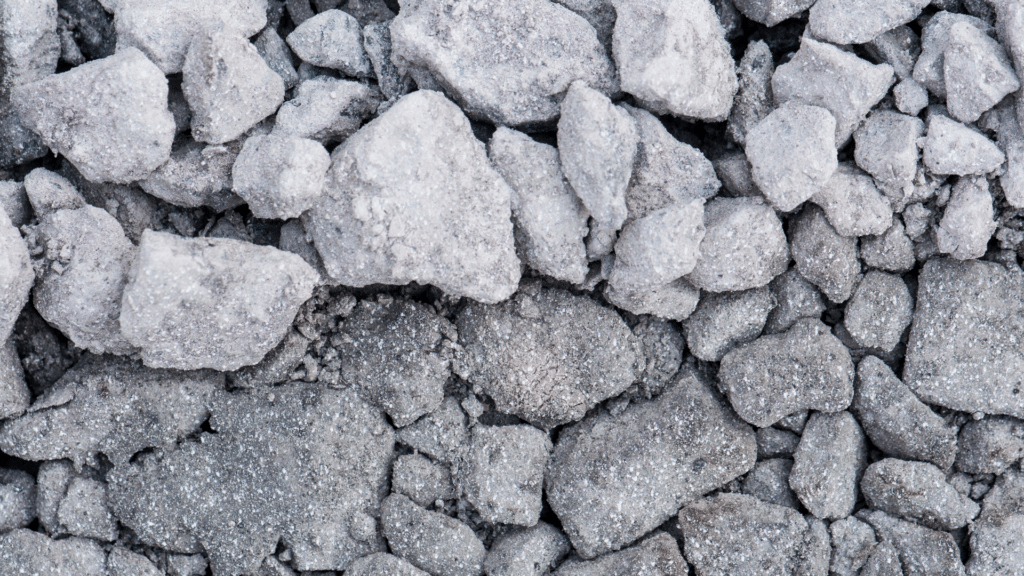
Crushed Limestone
Crushed limestone is a type of road base made from crushed hard rock that is pounded into a predictable rock size and dirt/dust. Limestone is most commonly used, but crushed concrete can be used as well.
Pit Run
Pit run is the river rock alternative to road base. The rock is not crushed, but is dug straight out of the ground resulting in a mixture of river rock and dirt (fines). This material is not recommended as a foundational material, but can be an economical option if you are building a country road and your closest pit is a river rock pit. A road with pit run as a base has less longevity than a crushed limestone road because it doesn’t share the same “locking” properties as a crushed rock. A smooth river rock is unable to “lock” into place like crushed rock.
Crusher Fines
Crusher fines are technically the same as road base, we highly recommend people do not use this material for their drives Crusher fines are a budget material that wont have rocks larger than 3/8″. We highly recommend people do not use this material for their drives because it will be a heavy powder substance that needs to be properly applied, wet, left to dry, wet again, left to dry, etc before it can harden to the point of driving on it. If haphazardly applied, the material will just turn to a soupy messy material.
Caliche
Caliche is a naturally occurring material that is not sold to the public anymore but was popular as a cheap road construction material in previous decades. The industry has turned away from caliche because of its appearance, and difficulty of application, and tendency to harden after installation.
Asphalt Millings
Asphalt millings could be considered a replacement for road base, but not exactly. It depends heavily on the use case. For example, if you are building a country road you would likely still need a road base (flexbase) but you could put asphalt millings on top of that for a different look/finish.
Join Our Team
Our 100% Owner Operator fleet specializes in transporting aggregate, flatbed, step deck, heavy haul, pneumatic, water tanker, and power only freight. Our carriers are provided a direct contact to the person handling their dispatch. Our expert dispatchers have decades of experience and work hard to provide stress-free freight booking experience. Join our team of skilled truck owner operators and be part of the strongest construction trucking fleet in Central Texas.
Cost of Crushed Concrete Road Base Compared to Alternatives
When it comes to cost, crushed concrete road base is often cheaper than alternatives like asphalt or crushed limestone. Gravel, while initially less expensive than Crushed concrete, requires regular maintenance, increasing the cost over time. Asphalt, although durable, comes with a higher upfront cost and may incur additional maintenance expenses with extended use. However, the higher costs of asphalt and crushed limestone may be justified for projects where durability and stability are paramount. We always recommend speaking to a professional to determine which road base works best for your needs.
Texas Road Base FAQs
Is road base good for a driveway?
Absolutely, road base, especially Crushed concrete, is a fantastic option for driveways. It offers a stable and sturdy base that can withstand the weight of vehicles, making it perfect for residential driveways. Additionally, using road base is cost-effective and environmentally friendly, as it is made from recycled materials.
Is road base the same as flex base?
Yes, flex base is a type of road base. The term ‘flex’ refers to the quality of the material being processed. Unlike State Spec Base, flex base doesn’t meet state standardized requirements. Recycled Base (CCRB) is another type made from recycled crushed concrete, which might or might not meet state standards.
What does road base look like?
Generally, road base has a r coarse look, resembling a mix of small rocks and dirt, but can appear differently depending on the material. Crushed concrete for example, appears as crushed concrete pieces in various sizes, ranging from fine particles to larger chunks, often with a rough texture. Other materials like gravel or crushed limestone also have a similar appearance, with varying sizes and textures of crushed stones.
How thick should road base be for driveways?
The recommended thickness for driveway road base typically ranges from 4 to 6 inches for stability and durability. However, this can vary based on material, traffic, and soil conditions. For precise specifications tailored to your project, consult with Twisted Nail’s experts.
Conclusion
The 2024 Texas Construction Outlook presents a dynamic and ever-evolving landscape shaped by legislative decisions and industry shifts. For Twisted Nail LLC Trucking & Aggregates, adaptation and strategic planning are paramount. With more funds allocated to Texas infrastructure, we can brace ourselves for a wave of construction projects all year round. This not only leads to a higher demand for raw materials but also an increased need for the support and expertise to see these projects through.
